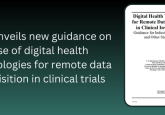Peterson Health Technology Institute to assess digital solutions for hypertension and mental health conditions

With an emphasis on their clinical effectiveness and economic impact, the Peterson Health Technology Institute (PHTI) will assess digital tools for the management of hypertension and mental health conditions such as depression and anxiety.
PHTI has announced their intent to conduct independent assessments of digital health technologies (DHTs) for hypertension and mental health conditions to inform payers, providers and patients. Employing a rigorous assessment framework, PHTI will evaluate DHTs based on their clinical benefits, economic implications, and impact on health equity, user experience, and data privacy. The framework seeks to accomplish two goals:
- To set evidence standards that guide technology developers to generate robust evidence on their products
- To provide reviews that help organizations adopt high-impact DHTs with the strongest evidence for delivering improved clinical outcomes and cost savings.
This assessment framework will serve as the roadmap for future evaluations of DHTs by the Institute for Clinical and Economic Review (ICER) and the PHTI.
Around 120 million adults in the US have hypertension, yet less than a quarter of them effectively manage their condition. Annual out-of-pocket expenses for people with hypertension are approximately $2000 higher than for those without the condition. Medical experts stress the importance of self-management, advocating for regular monitoring, heightened physical activity, and adherence to strict medication regimens. Substantial investments have been allocated to DHTs, with the goal of significantly reducing blood pressure, improving the frequency of monitoring, and minimizing visits to emergency departments and primary care facilities.
Similarly, for mental health conditions affecting nearly 60 million US adults and resulting in significant costs annually, virtual care solutions offer opportunities for more accessible and diverse care options. These include various forms of therapy, medication management, coaching, and peer support, delivered via video or messaging platforms. The aim is to alleviate anxiety and depression, enhance patient satisfaction, and reduce healthcare spending.
Caroline Pearson, executive director of PHTI, remarked, “Digital technologies have the potential to improve access to care and management of chronic conditions. With so many digital solutions on the market for hypertension and mental health care, payers, patients, and providers need access to transparent and independent evaluations to better understand which tools perform best to improve patient outcomes and affordability.”
The forthcoming evaluations of these digital solutions by PHTI, scheduled for release in the latter half of 2024, are anticipated to provide vital insights into their effectiveness and economic viability, aiding stakeholders in making informed decisions about their adoption.
Want regular updates on the latest real-world evidence news straight to your inbox? Become a member on The Evidence Base® today>>>






